Welcome!
Zsolt Fejérvári
Double Bass

Zsolt Fejérvári studied with Zoltán Tibay and Péter Kubina at the prestigious Liszt Academy of Music in Budapest.
While still a student at the Academy, he was awarded a special prize at the International Competition of Markneukirchen and became Principal Bass of the Munich Chamber Orchestra.
Between 1994 and 2000, he led the double bass section of the Budapest Festival Orchestra, followed by three years in Switzerland with the Orchestre de la Suisse Romande. Since December 2002, he has been a member of the BFO again.
On his first Hungaroton recording, he performs concertos for double bass and orchestra by Sperger and Vanhal (both friends of Mozart) with the Erkel Ferenc Chamber Orchestra.
He was the soloist for the world-premiere recording of Eugen Zador’s double bass concerto Fantasia Hungarica, released by Naxos in 2018.
In 1996, he won Second Prize at the "Giovanni Bottesini" International Competition in Cremona, Italy (no first prize was awarded). He has also won the Sándor Végh Competition of the Budapest Festival Orchestra five times.
In the same year, he was personally invited by Maestro Sir Georg Solti to join the World Orchestra for Peace, where 78 musicians from the world’s leading orchestras celebrated the 50th anniversary of the United Nations.
He performs regularly with the Franz Liszt Chamber Orchestra, the Kodály Quartet (whose Naxos recording of Bruch’s Octet won several nominations and prizes), the Akadémia Quartet, and the Auer Quartet. His chamber music partners have included Nicolas Altstaedt, Kristóf Baráti, Bence Bogányi, Nikita Boriso-Glebsky, Boris Brovtsyn, Diego Chenna, Jonathan Cohen, Nicolas Dautricourt, Clara Dent, Blythe Teh Engstroem, László Fenyő, Vilde Frang, Balázs Fülei, José Gallardo, Zoltán Gál, Ilya Gringolts, Márta Gulyás, Giovanni Guzzo, Narek Hakhnazaryan, Maximilian Hornung, Vashti Mimosa Hunter, Heinz Holliger, Alina Ibragimova, Nobuko Imai, Jonian Ilias Kadesha, Daishin Kashimoto, Kim Kashkashian, Barnabás Kelemen, Zoltán Kocsis, Katalin Kokas, György Konrád, Patricia Kopatchinskaya, Adrien La Marca, Christian-Pierre La Marca, Alexei Ljubimov, Yuri Martinov, Marie-Luise Modersohn, Edgar Moreau, Alexei Ogrintchouk, Csaba Onczay, Mikhail Ovrutsky, Laurence Power, Rosanne Philippens, Alina Pogostkina, Zoltán Rácz, Gustav Rivinius, Ditta Rohmann, Rafael Rosenfeld, Adam Römer, Sir András Schiff, Hariolf Schlichtig, Yuuko Shiokawa, Kian Soltani, Vilmos Szabadi, Gábor Takács-Nagy, Kirill Troussov, Milan Turkovic, Alexander Rudin, István Várdai, Tamás Varga, and Helena Winkelman.
He has been invited to perform with the Chamber Orchestra of Musikdorf Ernen (György Sebők Festival, Switzerland), as well as the Philharmonia Végh led by András Keller. He is a regular guest of András Schiff’s own chamber orchestra, Cappella Andrea Barca, as well as Camerata Bellerive in Geneva (led by Gábor Takács-Nagy), the "kamara.hu" Chamber Music Festival (artistic directors: Dénes Várjon, Izabella Simon), the Kaposvár International Chamber Music Festival (Kaposfest), the Festival Academy Budapest, the Ittingen Festival, the Lockenhaus Chamber Music Festival (founded by Gidon Kremer, artistic director: Nicolas Altstaedt), and the Musica Léman Festival (Switzerland). He is a member of UMZE, Hungary’s leading ensemble for contemporary music. He is also regularly invited as Guest Principal Bass to the Munich Chamber Orchestra, the Haydn Philharmonie, the Esbjerg Ensemble (Denmark), and others.
After three extensive periods performing with the Israel Philharmonic Orchestra in 2024 as Guest Principal Bass (including Mahler’s Third Symphony conducted by IPO Artistic Director Lahav Shani), he was invited to return in April 2025 for two additional periods as Guest Principal Double Bass.
He has served as a jury member for the "Giovanni Bottesini" International Bass Competition in Crema, Italy (2022) and twice for the "Dittersdorf" International Bass Competition in Banská Bystrica, Slovakia.
He has appeared as a soloist performing double bass concertos under world-famous conductors such as Iván Fischer, Mark Wigglesworth, Leonidas Kavakos, and Gábor Takács-Nagy, in prestigious venues including the Main Hall of the Amsterdam Concertgebouw, London’s Royal Albert Hall, and the Main Hall of Polish Radio in Warsaw.
Since 2011, Zsolt Fejérvári has served as Assistant Professor of Double Bass (with habilitation) at the Liszt Academy of Music in Budapest. All of his students who have graduated under his guidance have become respected musicians in prestigious Hungarian and international orchestras after winning auditions. His students have also achieved numerous competition victories.
Vilmos Mohácsi, who completed his Bachelor and Master studies at the Budapest Music Academy under Zsolt Fejérvári, reached the top 6 in the 2023 ARD International Music Competition in Munich from more than 100 applicants. Shortly thereafter, he won the position of 2nd Principal Double Bass with the Wiener Symphoniker.
In 2025, Zsolt Fejérvári served as the coach for the double bass section of the European Union Youth Orchestra's summer tour. He has given masterclasses in the UK (invited by the legendary Thomas Martin to his class in Birmingham), Brazil, Slovakia, Poland (Katowice, Kraków), Hong Kong, and Paris (CRR and CNSMDP conservatoires), Davidsbündler Academy / The Hague, among others.
He also teaches extensively online; his teaching website is available at https://studybass.live
He is often the dedicatee of contemporary works, such as Sonnet 74 by Helena Winkelman (world premiere in Lockenhaus with Ilya Gringolts, Helena Winkelman, and Péter Szabó).
Zsolt Fejérvári plays a fine 19th-century bass by Brücknert, offered to the Budapest Festival Orchestra by Lord Rothermere in 1995.
For solo appearances, he plays a specially built solo-tuned bass crafted for him by the talented young German luthier Stefan Krattenmacher. His bow was made for him in 2023 by the award-winning French bowmaker Boris Fritsch.
Total time: 49'58"
Relase date: 2006. Hungaroton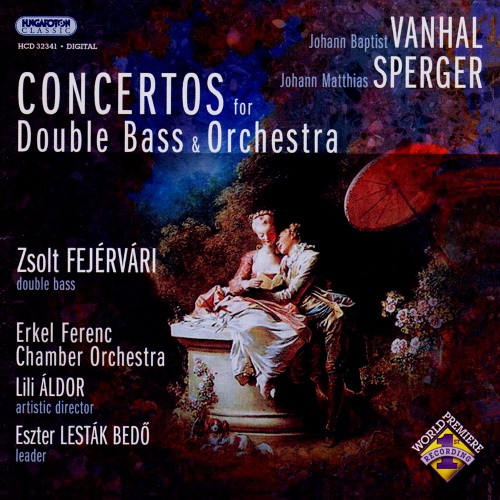
VANHAL Johann Baptist:
1-3 D-dúr nagybőgőverseny 22'44"
SPERGER Johann Matthias:
4-6 D-dúr nagybőgőverseny 27'08"
Musicians:
Recording producer, Edited by: Bárány Gusztáv Balance engineer: Csintalan László, Recorded at Hungaroton Studio on 1-4 March, 2005 Scores: Manuscripts owned by Schwerin Landesbibliothek Mecklenburg -Vorpommern, Edited by Fejérvári Zsolt Design: Nagy Péter Booklet editor: Gyenge Enikő
More information: https://hungarotonmusic.com/classical/concertos-for-double-p2879.html
Ferenc Erkel Chamber Orchestra
Leader: Eszter Lesták Bedő
© Hungaroton
Budapest Festival Orchestra
Mark Whigglesworth
© Live recording of the Hungarian Radio
Anikó Novák, piano
© Preludio
Anikó Novák, piano
© Preludio
2025
July
Coaching of the bass section of the European Union's Youth Orchestra (one week in Grafenegg / Austria).
Chamber music in the Festival Academy Chamber Music Festival, Budapest
August
Tour with the Budapest Festival Orchestra conducted by Ivan Fischer / London (BBC Proms Festival in the Royal Albert Hall), Edinburgh Festival
September
Mozart's Don Giovanni with the Budapest Festival Orchestra
2024
January
Concerts with the Budapest Festival Orchestra (cond. by Gerard Korsten)
February
2-3: 'Winterfest' Festival Academy Chamber Music Festival, Lillafüred / chamber music with Barnabás Kelemen, László Fenyő, Maxim Rysanov, Dóra Kokas, Nikita Boriso-Glebsky, José Gallardo, Thorsten Johanns, Tamás Benkócs, Szabolcs Zempléni
4th: Nielsen: Serenata with musicians of the BFO
Tour with the Budapest Festival Orchestra (cond. by Iván Fischer) / Vienna, Baden-Baden
Concerts with the Budapest Festival Orchestra (cond. by Jaime Martín)
March
15th March-8-th April 2024: 14 concerts as Guest Principal Bass of the Israel Philharmonic, Tel Aviv
April
27-29 April: Concerts with the Budapest Festival Orchestra (cond. by Paavo Järvi) / Budapest, Pécs
May
7th May-20th May: Concerts in Budapest and tour with the Budapest Festival Orchestra (cond. by Iván Fischer, soloists: Veronika Eberle, Steven Isserlis) / Vienna, Madrid, Reggio Emilia, Frankfurt
June
1-7 June - Concerts in Budapest and tour with the Budapest Festival Orchestra (cond. by Iván Fischer, soloists: Veronika Eberle, Steven Isserlis) / Ankara, Istambul, Bruges
Tour with the Budapest Festival Orchestra (cond. by Iván Fischer) / Strauss: Ariadne auf Naxos / Spoleto
Chamber music concert in Castiglione della Pescaia with Erika Illési
July: Lockenhaus Kammermusikfest (A) / chamber music with Nicolas Altstaedt, Heinz Holliger
30th July - 10th Aug - Concerts as Guest Principal Bass of the Israel Philharmonic, Tel Aviv conducted by Lahav Shani
12-14 August: CD recording and concert in Kaposvár (H) at the Kaposfest Chamber Music Festival with Kirill Troussov (violin), Máté Szűcs (viola) and Zoltán Fejérvári (piano)
2025
3rd of March: Dvorak Quintet in the Main Hall of the Bartók National Concert Hall with Barnabás Kelemen, Katalin Kokas, Gáspár Kelemen and László
Tour with the Budapest Festival Orchestra (cond. by Iván Fischer) with works by Prokofiev (Royal Festival Hall, London, Musikverein, Vienna
28th-31st March: Master classes in Paris (CRR - City Conservatoire, Paris, and CNSMDP - Conservatoire National Supérieur de Musique et de Danse de ParisApril
Playing as Guest Principal Player of the Israel Philharmonic Orchestra
May
Tour with the Budapest Festival Orchestra (cond. by Iván Fischer) with works by Mahler and Mendelssohn (Concertgebouw, Amsterdam, Geneva, Luzern, Zurich, Bruges)
11th of May: Master Class in The Hague (Netherlands), Davidsbündler Music Academy)
Bach, J.S.: Suite G-Dur/G major: Preludium-Allemande-Courante-Menuet -Gigue
Francaix, J.: Theme varié
Jestl, B.: Basspeace (1988)
Pflüger, A.: Capriccio per contrabbasso (1982)
Zbinden: Hommage a Bach, op.44 (1969)
Bach, J.S.: 3 sonatas for viola da gamba
Bartók, B.: Rumanian Dances
Beethoven, L.v.: Sonatas op.5 Nr. 1, 2, 4
Bottesini, G.: Fantasia sulla „Beatrice di Tenda"
Tarantella
Elegia
Fantasia „La Sonnambula"
Capriccio di bravura
Variations sulla ,Nel cor piu non mi sento" di Paisiello
Bruch, M.: Kol Nidrei
Gliere, R.: Intermezzo & Tarantella
Handel, G.F.: Sonata g-moll/G major
Hindemith, P.: Sonata (1949)
Mozart, WA.: Adagio E-Dur/E major
Misek, A.: Sonaten/Sonatas Op.6 Nr. 1, 2
Paganini, N.: Moto perpetuo
Ravel, M.: Pavane
Schubert, F.: Sonata Arpeggione
Sperger, J.M.: Sonata
Tittel, Gerhard.. Impressionen (1989)
Rossini, G.: The six quartets (vl.,vla.,vc.,cb.)
Duetto per violoncello e contrabbasso
Schubert, F.: Trout Quintet (vl.,vla.,vc.,cb.,pf.)
Oktett/Octet/Octuor (vl.,vl.,vla.,vc.,cb.,cl.,fg.,cn.)
Sperger, J.M.: Romanze for double-bass & string quartet
Bottesini, G.: Concertos Nr. 1 & 2
Grand Duo Concertant for double-bass, violin & orchestra
Duo Concertant for double-bass, violoncello & orchestra
Dittersdorf, K.D.: Concerto in E major
Dragonetti, D.: Concerto for double-bass
Sperger, J.M: Concerto in D major nr.15
Koussevitzky,S.: Concerto for double-bass
Urbanner, Erich: Concerto for double-bass
Vanhal, J.B.: Concerto in D major
Nach Norbert Duka meldet sich nun ein zweiter ungarischer Kontrabassist mit einer Soloaufnahme zu Wort: Zsolt Fejérvári, Jahrgang 1968, erster Bassist im Budapester Festival Orchester. Er war mit 23 Jahren bereits Solobassist beim Münchner Kammerorchester und gewann den begehrtenBottesini-Baß-Wettbewerb in Cremona. Die höchste Auszeichnung aber war es wohl, daß ihn sein Landsmann Sir Georg Solti in das „Weltorchester für den Frieden" berief, in dem 8 Musiker aus allen führenden Orchestern der Welt zum 50-jährigen Jubiläum der Vereinten Nationen musizierten.
Sein Spiel auf der neuen CD aus Ungarn (Text nur ungarisch und Englisch) verrät wirklich seine Sonderklasse: eine große Musikalität gepaart mit schöner Tongebung und exzellenter Technik. Er verzichtet auch auf jedwedes Schnaufen und Atmen, wie man es sonst von Aufnahmen bei diesem schweißtreibenden Geschäft vernimmt. Wie er die heiklen Stellen im Rondo der Beethoven-Sonate g-Moll meistert, das grenzt an Zauberei. Dabei versucht er nicht krampfhaft, das originale Cello zu kopieren, sondern besinnt sich auf die Qualitäten, Möglichkeiten und Grenzen seines Instruments.
Drei Sonaten hat Fejérvári aufgenommen, die alle irgendwo eine Berechtigung mitbringen, auf dem Baß gespielt zu werden. Die G-Dur-Sonate von Bach ist eine der drei Gambensonaten, und wer will abstreiten, daß der Kontrabaß von der Gambenfamilie abstammt? Schuberts „Arpeggione"-Sonate wird hauptsächlich von den Bratschern und Cellisten vermarktet. Die Mehrsaitigkeit des Originals führt auch zum Baß, den es immerhin in der Version als Fünfsauer gibt. Beethoven selbst soll den italienischen Bassisten Domenico Dragonetti am Klavier begleitet haben, als er dessen g-Moll-Sonate spielte. Angeblich war er so gerührt, daß er beide umarmte, den Spieler und das Instrument.
Am Flügel begleitet die Pianistin Anikó Noväk, eine sehr versierte Künstlerin, der man anmerkt, daß Kammermusik ihre Domäne ist. Für diese Aufnahme ist sie sicher ein Glücksfall, wenn sie auch unverschuldet zu sehr im Vordergrund ist. Wenn man an dieser durchaus empfehlenswerten CD etwas aussetzen will, so liegt das sicher nicht im Bereich der musikalischen Gestaltung, sondern allein an der Aufnahmetechnik. Der Baß fällt schon in der Mittellage weit hinter den Klavierklang zurück, in der Tiefe scheppert es bisweilen, weil nicht richtig ausgesteuert wurde, nur in den oberen Lagen kann sich der Bassist wirklich behaupten. Das ist ein Problem, das eigentlich längst als gelöst abgehakt wurde: man kann den Baß durch spezielle Stützmikrofone klanglich so auspolstern, daß die Balance zum Klavier gegeben ist. Daran müssen die Preludio-Studios noch arbeiten. Die Künstler hätten es verdient.
Wolfgang Teubner
In the third movement [in Mahler's First Symphony in the Carnegie Hall] - with its funeral march - the principal double-bassist played beautifully, and so did the bassoon, and so did others. But that heavenly G-major section, so smooth and transporting?
Jay Nordlinger, New York Sun
Max Bruch was 82 when he wrote his Octet, and Felix Mendelssohn was 16 when he wrote his. Bruch had a career as a conductor, a composer, and a teacher, but even after living the equivalent of two of Mendelssohn's lifetimes (Mendelssohn died at 38) he could not write an Octet to compare with Mendelssohn's. It is rather poignant to think about Bruch in 1920, at the end of his life, still writing in the style of the 1820s and still trying to write as well as Mendelssohn (who was himself trying to write as well as Mozart, Beethoven, Bach, and Handel).
These musicians give both pieces their best collective shot, and the resulting reading is extremely fine: resonant, articulate, clear, expressive, and full of all kinds of contrasts in texture. It is well recorded to pick up both the individual voices and the blend of voices. They do their best with the Bruch, but even the finest playing of the piece is not enough to raise it to the level of excellence that Mendelssohn reached at the tender age of 16.
Review by Fine, American Record Guide, October 2006
The Kodály and Auer Quartets join forces to produce these exceptionally enjoyable performances of the Mendelssohn and Bruch Octets (the latter joined by Zsolt Fejérvári on the double bass). The combined ensembles sound of uniform mind and spirit in both works, playing with a sense of joyous abandon in the Mendelssohn and sinewy vigor in the Bruch. The rich string tone lends an ingratiating warmth to the collective sound, while the players' impeccable musicianship assures that every note registers, even in the many rapid ostinatos that comprise much of the Mendelsson. The Kodály and Auer play from the heart as well as the head, certainly so in their delicate phrasing in the tender slow movements. Naxos' close-perspective recording keeps the performers at a comfortable distance while providing ample space for the string timbres to naturally resonate. This one's an easy recommendation: beautiful, stimulating music, marvelous performances, and excellent recording all at the Naxos price. What more could you ask for?"
10 out of 10" rating for both artistic and recording quality
Victor Carr Jr, www.classicstoday.com, 8 May 2006
"Vanhal műve kellemes, gáláns zene. Jó értelemben véve egyhangú. Spergeré kevésbé egységes, nagyobb eszköztárral kisebb hatást ér el. Az előadás azonban kiváló. Fejérvári Zsolt csodálatosan bőgőzik, bársonyos, finom hangzással, biztos technikával. A lemezt hallgatva nem kérdés, alkalmas-e ez a sokszor elhanyagolt és lenézett hangszer a szólista szerepre, zenekarral való versengésre - legalábbis lemezen és megfelelő akusztikájú teremben. Az elfelejtett, könyvtárakból előásott könyvek közt kevés az igazán érdekes, ám ha ilyen kiváló előadásban szólalnak meg, azonnal magukkal ragadják a hallgatót. Az Áldor Lili és Lesták Bedő Eszter vezette kamarazenekar igényesen, felkészülten kísér, lágy modoruk illik a koncertekhez. First - és first class - recording."
Z[ay] B[alázs], Gramofon, 2006. nyári szám
"...the concert was nothing short of revelatory. In part, the [Budapest Festival] orchestra draws its generous, zaftig sound from the basses. Where other ensembles relegate them to the side of the stage, Mr. Fischer places them on a raised platform at the rear of the orchestra, where they offer a big-brother embrace to the rest of the players..."
New York Times, Corinna da Fonseca-Wollheim, January 22, 2013
"... Annál hatásosabban érvényesült Vanhal E-dúr nagybőgőversenye, melyet Fejérvári Zsolt előadásában hallgatva nem csupán egy kitűnő kompozíció, de egy ígéretes előadóművész felfedezésének is részesei lehettünk. Fejérvári, akiről a műsorfüzetben az állt, hogy zeneakadémiai tanulmányai és a Müncheni Kamarazenekarnál eltöltött két év után 1994 óta a Fesztiválzenekar szólamvezetője, egyszerűen levette lábáról a közönséget. A lelkesedés jogos: az utóbbi években néhány fiatal magyar nagybőgős koncertjeiről írva, többször nyugtázhattam örömmel az újabb generációnak azt a törekvését, amely mintha minőségi változást igyekeznék előidézni a hangszer hazai kultúrájában. Most azonban Fejérvári teljesítményével akaratlanul is összehasonlítva őket, úgy találom, valamennyiük játékából hiányzik valami. Ez a fiatal muzsikus olyan harmóniában tárt elénk hangszeres perfeciót, kerekded formálást és kiegyensúlyozottan szuggesztív karakterizálást, nehézkes instrumentumán keresztül olyan könnyedén s olyan közvetlenséggel érvényesítette a darab priméren zenei mondanivalóját, s legfőképp oly természetes egyszerűséggel sugározta magából a zenélés örömét, hogy az minden elismerést megérdemel. Jó volna őt mihamarabb önálló esten, kamarazenészként is hallani."
Csengery Kristóf, Muzsika, 1994. október
This recording by talented young Hungarian bassist Zsolt Fejérvári features Sperger's Concerto No. 15.in D Major and a fluid and spirited reading of the "classic" Vanhal Concerto. Fejérvári's reading of the Vanhal is as good as any I have heard, and there is an ease to his playing, which belies the not inconsiderable challenges. The Vanhal, likewise, gets a vibrant and animated reading, and this recording may considerably enhance the concerto's appeal and acceptance. Sadly, so few of the eighteen concerti that Sperger wrote have hitherto been published, but they form a fascinating glimpse at the development of the form, written through his career, most notably during his employment at Pozsony, then later at the Mecklenburg-Schwerin court. The trumpet and timpani in the orchestration are at times very reminiscent of Haydn, and the Erkel Ferenc Chamber Orchestra sound excellent throughout the disc. The principal bassist of the Budapest Festival Orchestra, Fejérvári's first release in 1996 featured sonatas by Beethoven, Bach and Schubert, and he can also be heard on the Kodály Quartet's recording of the Bruch Octet. Concertos for Double-Bass and Orchestra is highly recommended.
Robert Nairn - International Society of Bassists - 08.2011
Scroll down and click on the selected images in the gallery to open!
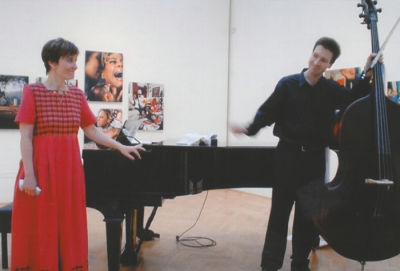

Kattintson a galéria megnyitásához!
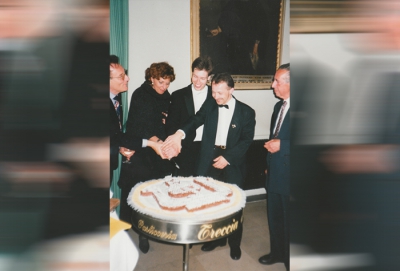

Kattintson a galéria megnyitásához!
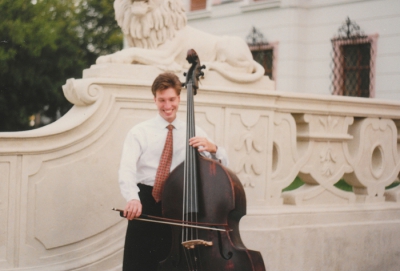

Kattintson a galéria megnyitásához!
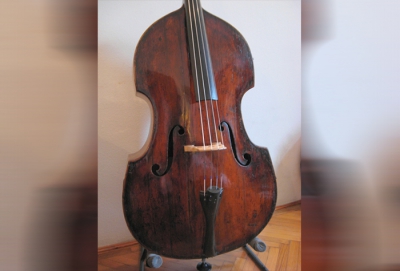

Kattintson a galéria megnyitásához!
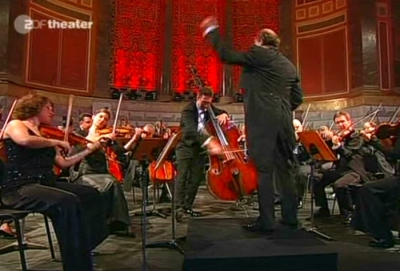

Kattintson a galéria megnyitásához!
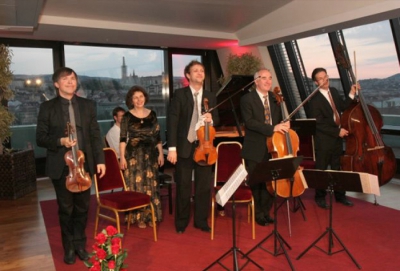

Kattintson a galéria megnyitásához!
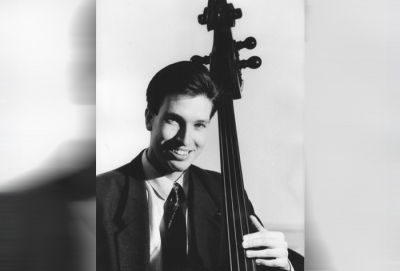

Kattintson a galéria megnyitásához!


https://youtu.be/38_FAUZEyhI?si=WbKIq9nMAFDb8CD_
Mobil: 36 20 919 06 05
E-mail: fejervarizsolt@yahoo.com
Online teaching website, registration: https://studybass.live